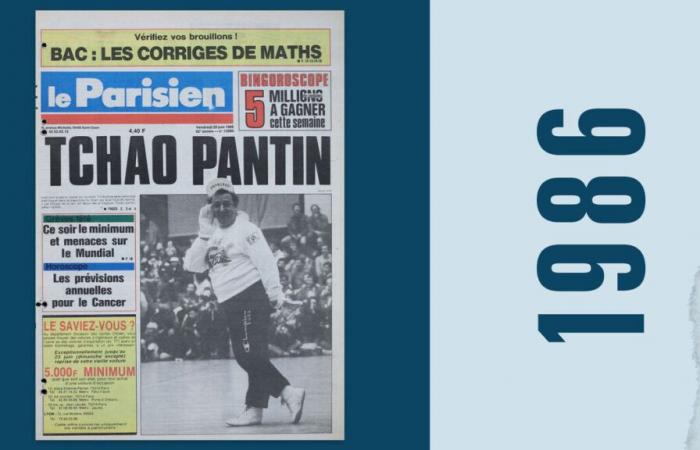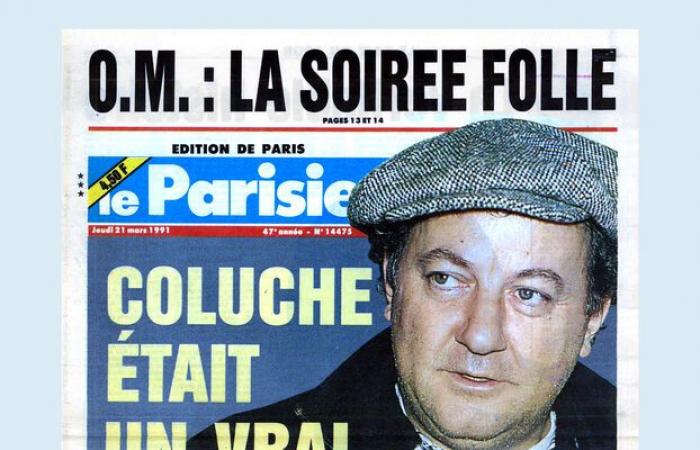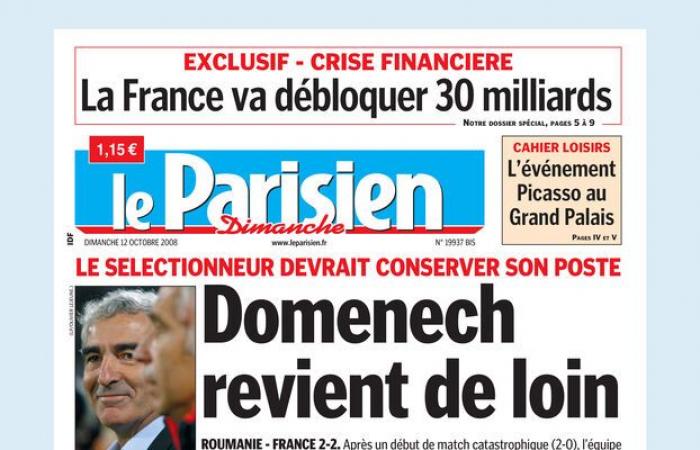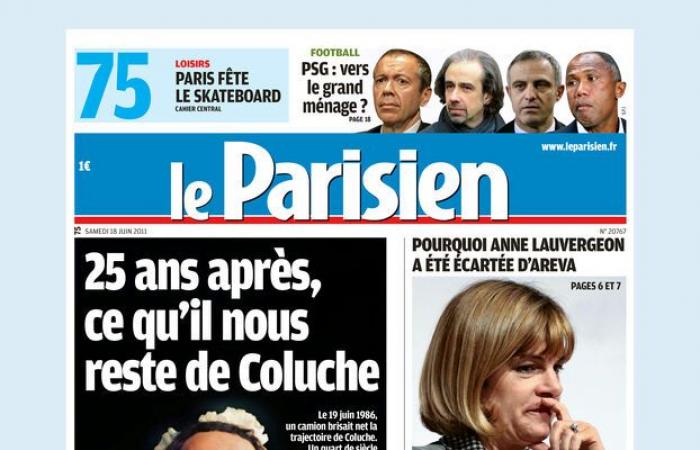Our anniversary event “80 years of Parisian, 80 headlines”
The very first issue of Le Parisien appeared on August 22, 1944, in the midst of the liberation of Paris. To celebrate this anniversary, we have selected 80 historical or emblematic “headlines” of their time. Sport, news items, conquest of space, presidential elections, disappearances of stars… They tell the story of eight decades of current affairs. We have chosen to tell you behind the scenes. A series to discover until the end of the year.
“Chao Pantin”. A raw and effective guaranteed title. His César for best actor for his only dramatic role in this film by Claude Berri dates from 1984, two years earlier. Five columns on the front page, with a photo of Coluche as a clown, tracksuit, Restos du coeur sweatshirt, cap and gaze turned towards the camera. A laugh as honest as his eyes in his eyes. They closed definitively on this day in June 1986, when a 38-ton semi-trailer maneuvering around a bend in a departmental road in the Grasse hinterland fatally struck it.
Coluche, crazy about motorcycles with large cubes, was he driving too fast on his Honda 1100? We will never really know, two theses clash over the years, but the comedian had already decided a year before on the Bugatti circuit in Le Mans, responding to a journalist: “The motorcycle? It's to scare me. It's very interesting. Sometimes it happens, even at 40 km/h. » Death in this garden with the scent of lavender, near Grasse.
In September of the previous year, the one who did not want to appear like a clown on two wheels had broken the world speed record for the kilometer launched on a motorcycle, in Italy, at 252 km/h. “What are we thinking about?” » asked the news presenter Bernard Rapp. “To squeeze your buttocks,” the comedian smiled.
Le Parisien, this Friday at the start of summer, is not afraid to use the metaphor in one of its interior titles: “The last slippage”… One of the articles on the following three pages explains this title which seems daring , even brutal today: the “national clown”, as he was nicknamed on television, had multiplied the outrages against his agent to the point of ending up being sentenced to prison, commuted to community service. year preceding his disappearance. Coluche is a star, but not yet an icon.
Not yet quite entered into posterity
Our newspaper is not afraid to add more in the biker register by evoking the death of Coluche, less provocative and more socially engaged for the benefit of the Restos du coeur, which he created the previous year, in 1985: “He take it easy. Except on his motorbike.” To reread a newspaper thirty-eight years later is to realize everything that is written in the urgency of closure, and to become aware of this edge moment when Coluche has not yet completely entered posterity, nor relieved of its excesses. The almost divine crown which illuminates the saint of Restos du coeur has not yet supplanted the jester. The asphalt and speed eater.
VideoColuche still relevant
In a post, our journalist Didier Christmann, who would later become a comic book writer, including “Achille Talon”, sums up with passion what he represents for the French: “A guy who pretended to be stupid so that we less so, a guy who photographed us in impossible postures, who rushed into the breaches of a lost society. A juggler of values, disappointed with the humanism which disgusted more than one. Derision for religion, to give absolution to one's fears, to one's anxieties. Like that, he was relaxed, nothing was important. He was an asshole, a loser, who had all the talents who, before slipping up, had put his heart on the tables. »
What will become of the Restaurants?
A surprising question today, but very relevant on the day of his disappearance, arises from our colleague Jacques Marestet who, after questioning the causes of the accident, looks at the legacy of the comic: “In the meantime , another question will arise this winter: who will take charge of these famous Restaurants du coeur which had made Coluche not only a clown, a talented comedian, but also a funny, charitable guy? »
The restaurants closed their doors at the end of the winter campaign, on March 21. “What will become of them? We have until December to find out. And try to restart the machine…” supports our newspaper. Our colleague Mireille Parailloux traces the birth of this humanitarian commitment: “It all started with 30 volunteers. » And these words from Coluche: “You'll see, I'm going to do something impossible: make those who have nothing eat. »
Death, life, Football. This June 21, 1986 was to launch a festive and cozy weekend with the Football World Cup in Mexico, as suggested by the second, much smaller, headline on the front page of Le Parisien: “TV strikes: this evening the minimum and threats to the Mundial”. That Saturday, viewers will see the France-Brazil match in Guadalajara, later voted “match of the century”. Two days after the death of Coluche, at the age of 42, such is the news and this Black Thursday before a Saturday of carioca madness and magic square.
Among the reactions to the comedian's disappearance, that of the Minister of Transport Pierre Méhaignerie: “Coluche's death is unbearable… like that of the 30 victims who die every day on the roads of France, in stupid accidents. » Rather dry. The Opio gamekeeper, who lives on the hill overlooking the road, has the right words: “You won't find two like him. As soon as an artist does good, he disappears… After Balavoine and his Band Aid, it's Coluche and his Restos du coeur who leave…”
They will remain, more and more essential, and he through them, when so many deceased comedians are only entitled to regular appearances on the airwaves of Rire et Chansons. Daniel Balavoine, disappeared on January 14, 1986, six months before, in a helicopter crash on the Paris-Dakar. The singer wanted, in the wake of Live Aid at Wembley in the summer of 1985, to launch a French version with France Gall and Michel Berger.
The story was just beginning
January 1986 also saw a major change in Le Parisien, which ceased to be called Le Parisien Libération, its name since its creation at the Liberation of Paris in the summer of 1944. Color made its appearance. Above all, our newspaper, and the very editorialized tone of the articles on Coluche shows it, is making a stylistic turning point, as Michèle Cotta tells us, a great audiovisual journalist then recruited with a few others to be one of the newspaper's editorialists: “Le Parisien , before 1986, was not a reference journal. Until then it was very popular like France-Soir, but without its signatures, and above all declining. A news journal, which wanted to be taken seriously on an editorial level. Le Parisien has become a reference newspaper, which has become more and more evident each year, each morning. »
And this is what is striking in these Coluche pages, this burning present drawn towards a narrative. The next day, June 21, space is given to the report, with this hallucinatory vision of a “pilgrimage of tourists in the fatal bend”, and this woman who “picks up a piece of the mirror glass” of the damaged motorcycle, in these few pieces of debris remained scattered on the asphalt. The terrain, the story from a human perspective or even at ground level, the true DNA of our newspaper.
The same age as our newspaper
The story with Coluche, in reality, was only just beginning. Le Parisien will devote a whole series of front pages to him over time, as the social dimension of his commitment takes root in memories, but also as an ever-present revealer of social misery.
In 1991, on the occasion of a reference biography devoted to him, Le Parisien, under the title “Coluche was a real Enfoiré”, stated: “Five years after his death, Coluche is already no longer what he was. he was. » His revelation as a comedian coming from a very popular background, his fall into drugs, his redemption as a social activist, the portrait is set.
And for good, “Coluche is immortal” in another headline from 2008, this time for a film. François-Xavier Demaison plays the comedian on the electoral campaign for the 1981 presidential election, under the camera of Antoine de Caunes. The double photo of Une brings together the original and its interpreter.
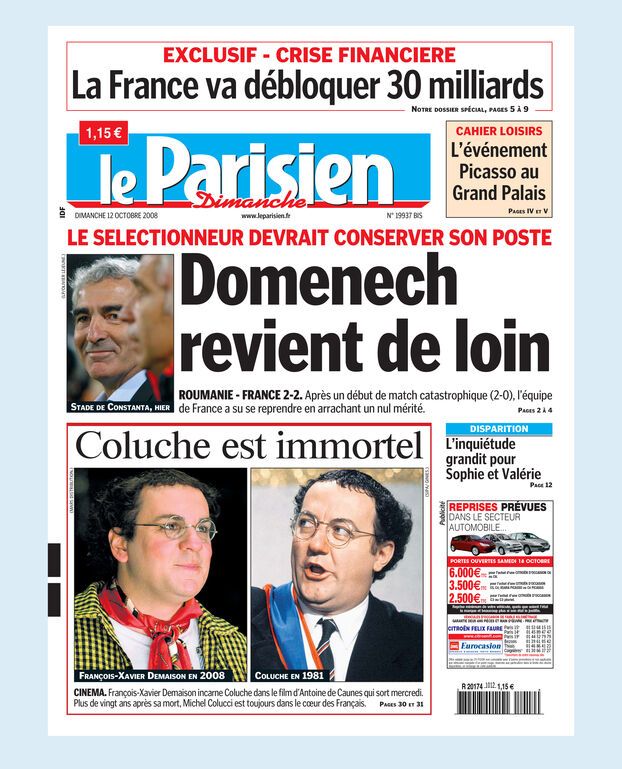
In 2011, the dynamiter of Shmilblick, this popular game of which he made a wonderful joke on Europe 1, returned to the front page again with this summary title: “25 years later, what we have left of Coluche”. The legend of one salutes Michel Colucci, son of an Italian immigrant house painter who died when his son was 3 years old, a little guy from the suburbs, in Montrouge, “symbol of a France from below which has not never forgot its origins.
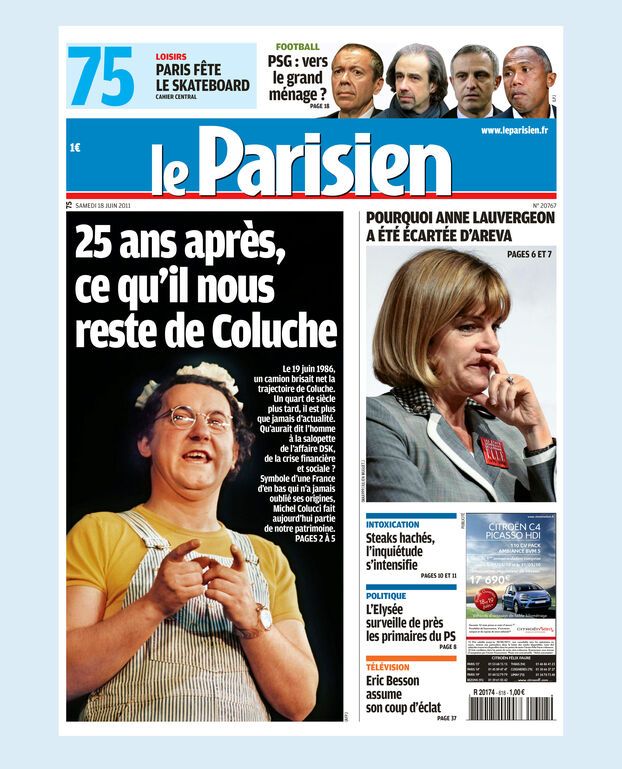
In 2016, for the 30th anniversary, “What remains of Coluche? » depicts him as a “committed comedian who left an indelible mark on French society”, always on the front page. A mark which, without a doubt, will not be erased in 2026 for the 40 years of his disappearance. Already ? Coluche would then celebrate his 82nd birthday. Born October 28, 1944 in Paris, he was almost exactly the age of our newspaper.

